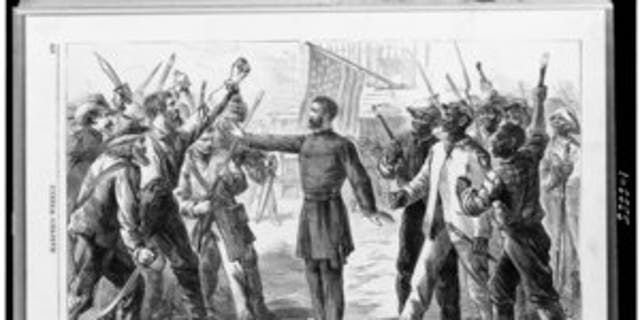In honor of Black History Month: Dr. Alexander Thomas Augusta, first Black surgeon in Civil War

health Eshrag:
NEWYou can now listen to Fox News articles!
Dr. Alexander Thomas Augusta faced many challenges being the first Black surgeon commissioned in the Union Army during the Civil War. He was eventually recognized for his merits and was the first Black officer-rank soldier to be buried at Arlington Cemetery.
Despite being named senior surgeon at Camp Stanton in Maryland in February 1864, during the Civil War, Augusta still faced racism from medical colleagues he worked with helping soldiers during the war, according to Dr. Heather Butts, a Harvard alumnus who studied public health. Butts is the Director of the Honors College at Long Island University, Brookville, New York, and wrote the book “African American Medicine in Washington, D.C.: Healing the Capital During the Civil War Era,” which depicted the surgeon’s life.
Image of Alexander Thomas Augusta
(Wikipedia)
“Some of the white surgeons that reported to Augusta wrote to President Lincoln informing him of their displeasure at having to report to Augusta. They requested ‘most respectfully yet earnestly’ that this ‘unexpected, unusual and most unpleasant relationship in which we have been placed’ come to an end.” Their letter also stated:
“‘But we cannot … willingly compromise what we consider … proper self-respect, nor do we deem that the interests of either the country or of the colored race can demand this of us.’ Dr. Augusta was transferred out of Camp Stanton,” Dr. Butts wrote in a statement to Fox News.
BLACK HISTORY THROUGH THE YEARS: 10 FAMOUS FIGURES IN THE US
According to a published report in the National Medical Association, Dr. Augusta was born a free man in 1825, in Norfolk, Va. He learned to read secretly and moved to Baltimore, Md., where he studied medicine with tutors, since it was against the law to teach people of color, the article said.
The article recounted how Augusta worked with Dr. William Gibson of the University of Pennsylvania but was denied admittance to the university’s medical school. He eventually went to Canada, where he received his bachelor of medicine degree, with full honors, from Trinity Medical College of the University of Toronto in 1856.
Augusta returned to the states and wrote a letter to President Abraham Lincoln requesting to be appointed as a surgeon for one of the black regiments formed by the Union Army. He was granted a surgeon’s commission in the Union Army in 1863, according to the article.
Butts described how this preeminent surgeon faced and triumphed over the bigotry. “Through it all, he faced this adversity in a way that allowed him to give back to his patients, and society,” Dr. Butts told Fox News.

A Bureau agent stands between a group of whites and a group of freedmen. Harper’s Weekly, July 25, 1868.
(Wikipedia)
While traveling to testify in a court-martial on February 1, 1864, Augusta was delayed due to a racially-charged incident on a trolley car incident. According to Butts, Augusta attempted to enter the trolley but was told he had to ride on the front of the car since it was against the rules for colored persons to ride inside. The surgeon was kicked off the trolley when he refused to ride outside the car and had to walk to the courthouse, where he was late to the hearing.

Sumner, c. 1860 United States Senator from Massachusetts
(Wikipedia)
The incident caught the attention of Senator Charles Sumner of Massachusetts who helped pass a resolution before Congress that resulted in the desegregation of trolley cars in Washington, D.C. in the 1860s.
Dr. Augusta not only helped soldiers heal on the front lines during the Civil War, but also helped pave the path for Black Americans pursuing careers in the medical field. In 1868 Augusta was the first African American to be appointed to the faculty of Howard University and the first to any medical college in the United States.
CLICK HERE TO GET THE FOX NEWS APP
“My hope is that there will be many more stories and books and articles about Dr. Augusta and the other brave African American surgeons who served during the war, and that their stories and their legacy will get the attention they so richly deserve,” Dr. Butts told Fox News.
Noting that the news was copied from another site and all rights reserved to the original source.
xnxx,
xvideos,
porn,
porn,
xnxx,
Phim sex,
mp3 download,
sex 4K,
Straka Pga,
gay teen porn,
Hentai haven,
free Hentai,
xnxx,
xvideos,
porn,
porn,
xnxx,
Phim sex,
mp3 download,
sex 4K,
Straka Pga,
gay teen porn,
Hentai haven,
free Hentai,


